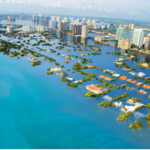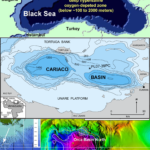June 21, 2018 – It’s the summer solstice in the Northern Hemisphere today, a time of the year when daylight lingers in Toronto for more than 16 hours. It’s also National Aboriginal Day here in Canada, beginning with sunrise ceremonies across the nation led by First Nations, Metis, and Inuit peoples. And for me, it is a day to reflect on the environmental health of the world around me.
In the last two weeks, Toronto has experienced two violent but short-lived rain and windstorms. These punctuated events are unlike anything seen in the past except when we have been on the receiving end of large cyclonic storms coming up from the Gulf of Mexico or from the northeast Atlantic Ocean. At both weather events, the rain bursts caused extensive flooding on Toronto streets while the wind felled hundreds of trees across the city. I was driving to a dinner event in the aftermath of one of the storms, and a 30-minute commute took over 2 hours because of felled trees, downed power lines, and hundreds of non-functioning traffic lights. I never did get to the dinner because the event was long past by the time I arrived at my destination. I suspect we will see more of these weather events in the years to come as the atmosphere warms and becomes more turbulent in the mid-latitudes of our planet.
Speaking of the latest environmental insult, Donald Trump this week signed an executive order revoking an Obama-era directive aimed at protecting the oceans off America’s coasts, the coastlines, and the waters of the Great Lakes. Being National Ocean Month the President asked the nation to “reflect on the value and importance of oceans” and then immediately focused on extracting its resources whether oil and natural gas, fish, and anything else he could think of that could be removed from this invaluable resource.
For Trump, National Ocean Month is a time to strengthen federal waters for national security, to lay claim to an exclusive economic zone larger than the land mass of the United States, and to reduce America’s dependence on imported energy. No mention of conservation. No mention of environmental stewardship. No mention of biodiversity. No mention of plastic pollution. And of course no mention of climate change and rising sea levels. It seems appropriate that he chose this tone and renunciation of Obama-era conservation initiatives since it was only a year ago during a previous National Ocean Month that the President announced America was pulling out of the Paris Climate Agreement. This ongoing disregard for reality fits with the President’s own litany of denial and lies about almost everything.
As Trump ignores the reality of what is happening to the oceans off his shores, a new federal government report issued by the National Oceanic and Atmospheric Administration (NOAA), a subset of his Department of Commerce, states that coastal areas of the United States are under siege from an increase in flooding events by as much as 60% over the last 20 years. Cities on the Atlantic and Gulf of Mexico coasts are the ones most affected including these top five: Boston, Atlantic City, Sandy Hook, Sabine Pass, and Galveston.
The same report notes that flooding events associated with high tides set new records in 2017. And rising sea levels along America’s coasts with or without strong storm or hurricane activity are leading to compromised coastal infrastructure including shoreline erosion, washed away roads, extensive property damage, and saltwater intrusion into freshwater aquifers.
The report further states that in 2017 more than 25% of the U.S. coastal areas recorded record-breaking high tide flood days. In fact, because the level of flooding has become so frequent, NOAA has set a new higher elevation threshold for future flood reporting. This change in reporting will probably suit the anti-climate President who, if he should read one in the future, can then claim that there are fewer flooding event days than in the past which means climate change is hogwash.
Of course, changing how flood days get measured and reported doesn’t speak to a growing economic reality. In the latest study from the Union of Concerned Scientists, it reports that 2.4 million American homes and businesses worth more than $1 trillion are at risk from flooding as the century progresses, amounting to 15% of all coastal real estate in the country. A link to the report entitled “Underwater,” is provided.
You would think that a President, who in his business life has been a property developer, should be concerned about his own personal real estate holdings along America’s coastlines as well as properties overseas. But in his acknowledgment of National Ocean Month, Trump appears to be in denial of the reality of changes his own administration is reporting as the climate changes.
















